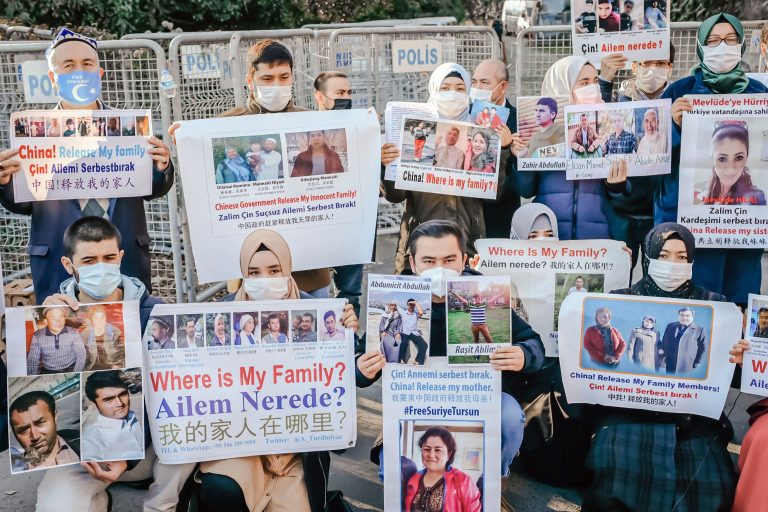The Chinese Communist Party (CCP) mouthpiece China Daily published a propaganda piece on Jan. 8 claiming the eradication of religious extremism, rather than a state-sanctioned policy of forced sterilization, is what led to a shocking decrease in the Uyghur birth rate in the Xinjiang region.
The Chinese Embassy in the U.S. Twitter account, an official Chinese government account, promoted the article in a now-deleted tweet: “Study shows that in the process of eradicating extremism, the minds of Uygur women in Xinjiang were emancipated and gender equality and reproductive health were promoted, making them no longer baby-making machines. They are more confident and independent.”
The article seeks to spin the narrative away from a June report on forced sterilization of Uyghur women published by the Jamestown Foundation, a Washington, D.C.-based non-partisan institute originally founded in 1984 to support Soviet defectors.
The report, authored by Dr. Adrian Zenz, a Senior Fellow in China Studies at the Victims of Communism Memorial Foundation, titled “Sterilizations, IUDs, and Mandatory Birth Control: The CCP’s Campaign to Suppress Uyghur Birthrates in Xinjiang” found natural population growth in Xinjiang fell by 84 percent in the two largest Uyghur prefectures between 2015 and 2018, noting one region fell to an almost zero birthrate in 2020.
“Government documents bluntly mandate that birth control violations are punishable by extrajudicial internment in ‘training’ camps.
Success
You are now signed up for our newsletter
Success
Check your email to complete sign up
“Developing regional disparities between Uyghur and Han population change rates, the apparent impact of the internment drive, and an apparent campaign of mass sterilization in at least two Uyghur regions should give the global community major cause for concern,” the report says.
Zenz also found 2019 CCP documents revealing “plans for a campaign of mass female sterilization in rural Uyghur regions, targeting 14 and 34 percent of all married women of childbearing age in two Uyghur counties that year. This project targeted all of southern Xinjiang, and continued in 2020 with increased funding.”
The report found the funding was sufficient for “performing hundreds of thousands of tubal ligation sterilization procedures in 2019 and 2020.”
Yet China Daily’s article, complete with a photo of Uyghur children wearing masks and playing outside, claims “an increasing number of people in southern Xinjiang were deciding to marry and have children later in life, seeing the benefits of fewer but better births, and the change was due more to personal choice than government policy.”
The propaganda piece is based on a report published by a CCP organ that claims an apparent emancipation for Uyghur women, “extremism had incited people to resist family planning and its eradication had given Uygur women more autonomy when deciding whether to have children.”
The CCP’s report attempts a rebuttal of Zenz’s findings: “The changes were not caused by ‘forced sterilization’ of the Uygur population, as repeatedly claimed by some Western scholars and politicians, but that ‘safe, effective and appropriate contraceptive measures are now available to couples of childbearing age in Xinjiang, and their personal decisions on whether to use those measures — which include tubal ligation and the insertion of intrauterine devices — are fully respected.’”
The Party’s mouthpiece concluded that Xinjiang women “were deciding to marry and have children later in life, seeing the benefits of fewer but better births, and the change was due more to personal choice than government policy.”
But Zenz’s report found that a crushing crackdown on Uyghur families began in 2017 when the Xinjiang surveillance state became omniscient. Fines for breaking the Party’s population control policies were as high as three times the annual disposable income for the region.
Those who could not pay were sent to internment camps, where they were forcibly implanted with IUDs or sterilized.
The report also found that “numerous Uyghur county family planning documents list ‘long-term effective pregnancy prevention [drug] injections’ as part of their services.”
Testimony from Uyghur women in the area confirmed that many were forced to take undisclosed substances that led to irregular menstruation or loss of menstrual cycle, “former female detainees have testified to drugs or injections given during internment that caused them (and other women) to lose their menstrual periods or experience increased bleeding.”
Zenz concludes: “These findings raise serious concerns as to whether Beijing’s policies in Xinjiang represent, in fundamental respects, what might be characterized as a demographic campaign of genocide per the text of Section D, Article II of the U.N. Convention on the Prevention and Punishment of the Crime of Genocide.”
Follow us on Twitter or subscribe to our email list














